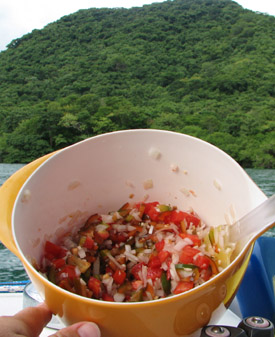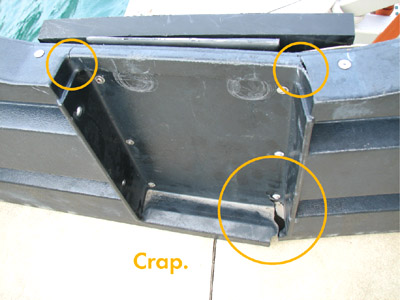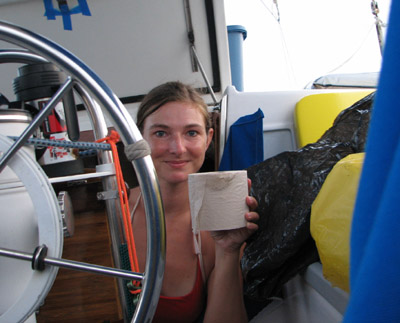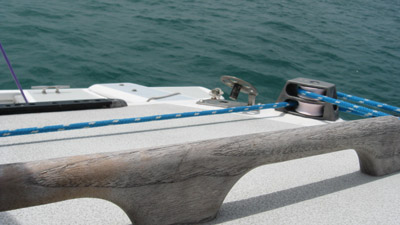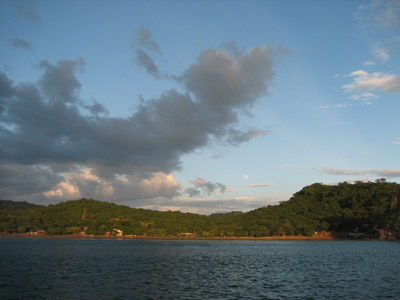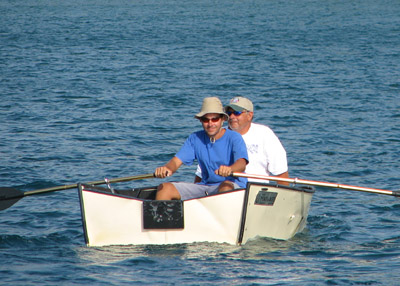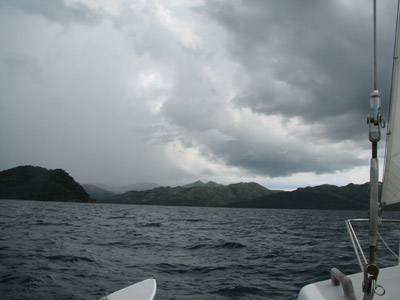We spent our first official day in Costa Rica in El Coco wandering the streets in the rain, being sure to drench those parts that may not have been entirely soaked during the surf landing. We had to check into the country, even though we’d already been kicking around Costa Rica (and even had, gasp, gone ashore once or twice) for the last week, easy. The port captain’s office was simple enough to find except there was a padlock on the gate leading to the front door. We wandered over to some police dudes loitering around the entrance of what probably was the police station and asked where the Port Captain was, explaining our predicament with concerned faces—that we want to check in, but… The policeman said it must be a holiday and to try again mañana, then he assured us that it was fine for us to be ashore in the country even though we had not yet legally entered since he saw us and decided we looked nice. Well, OKAY. We headed out on our various secondary missions of the day: ice, beer, internet, and cowboy hats (not necessarily in that order, well, ice and beer were definitely first-ish).
By the time we got back to the boat, an offshore wind had kicked up some icky chop and between this and the largish swell coming straight into the anchorage (El Coco offers no protection; nor, incidentally, do it offer coconuts), I felt queasy within an hour just sitting on the boat at anchor. We decided to head back around the corner into Bahia Culebra (Playa Panama) where we could anchor in a more protected spot and there spent a peaceful, if rainy, night.
The next morning, Joshua and I rowed ashore at Playa Panama to take a bus over the hill to Coco to do the check in, even though everyone was totally against this idea and I had only suggested it in passing and I’m a terrible, terrible person. Sheesh. Anyway, we began by having to wait a hundred years for the bus, which was late, and then it didn’t even go all the way to town but dropped us at a crossroad. Then it started to pour and, since a connecting bus was not forthcoming, we walked on a narrow road with no shoulder the three kilometers to town ourselves. The bus passed us right as we entered town and we were totally soaked and covered with mud spatters—basically looking and feeling our best for the Port Captain.
Outside the office (happily not padlocked this time) a few pieces of soggy cardboard had been placed thoughtfully at the door in hopes of keeping people like us from mucking up the office. We went in and requested to enter the country with our boat. The first question out of the secretary’s mouth was, “Is your boat anchored here?†And we of course had to say, “Well, nooooo…†She was instantly irritated and informed us that it had to be anchored in the El Coco anchorage to be checked in, then she harrumphed and asked to see the three copies of our title, two copies apiece of the passports, and one copy of the previous country zarpe. We didn’t have copies of anything and it was very clear that this was not acceptable at all. Through all this I sheepishly explained that we had been anchored in El Coco yesterday and tried to come check in but the office was closed and we talked to the policeman and the anchorage was impossible with the large swell so we moved the boat to Playa Panama. But of course we were happy to bring the boat back as soon as we could to get everything done properly. And of course we will make copies of everything, no problem. And I smiled nicely and did my best to look properly repentant for not having the copies ahead of time, and I tried to ignore Joshua’s Look of Doom. And I pretended like the secretary was not freaking out that we didn’t even have the boat with us nor did we have the necessary copies but that she was simply informing us that this was what was necessary for us to get things going. And that somehow seemed to work. She just sort of stopped being all bent out of shape, called in the Port Captain and explained the situation in a normal tone of voice.
The Port Captain was a very Port Captainy-looking guy, an older, slightly overweight dude with a mustache. He could furrow his eyebrows and look stern, or raise them to look nice and grandfatherly. He started out with the stern when she got to the part about the boat not being here (this was, of course, right at the beginning) but then turned grandfatherly as I embellished the story with how I was getting seasick with the huge swell in the anchorage but that we would be happy to move the boat back to El Coco ASAP if that would make things better. We would leave right this moment to do it, in fact. The Port Captain conferred with the secretary for a bit and then went back to his office. She told us that we needed to bring the boat back around and do it by 2pm. This was utterly impossible since it was pushing noon and it had taken us all morning to get to El Coco; to come around the point with the boat would take another two hours, if there was no swell/choppiness (which there would be) and wind (which there wouldn’t be). I carefully explained this and emphasized that we would absolutely move it first thing in the morning (when the sea is mellower) and be standing on her soggy cardboard when they opened the next day. No. Not possible. Her position seemed to be that this was a border and we had to be cleared before we could set one foot further into the country and never mind that with a little date-checking, it was highly likely we had been somewhere in Costa Rica for over a week. A little of the former exasperation returned, thereby cuing my sheepish and repentant expression, but she again talked to the Port Captain, trying to figure out how the hell they would deal with this highly abnormal situation.
The fact was, they were going to process our entry today, even if it killed several adorable kittens, and they had to figure out how to organize things with the Customs guy, who actually had to drive over from the airport in Liberia (maybe 30 miles away) to inspect our vessel. Which wasn’t even in town. The Port Captain got on the phone with the Customs guy, fully explaining the entire situation including the bit about me feeling seasick from the “muy feo†anchorage. The Customs guy still had to come and we would have to figure things out when he arrived; if it was still raining, it was likely that he wouldn’t even want to go out to inspect the boat at all. We all hoped for rain and the secretary sent us down the street for the requisite copies.
Upon return with the copies, paperwork got cheerily processed by the Port Captain who asked us all sorts of questions about this and that. The secretary sort of hovered around making sure he didn’t break the fax machine when he tried to use it or that he used the right phone to make calls. He then sent us down the street to the Immigration lady, who we needed to appear before at 1pm because she was currently on her lunch break. The Customs guy was due at the Port Captain’s office at 2:30, but best to return at 2:15.
We walked into the Immigration office and handed over our papers to the lady and she was all set to just process us as normal when she was derailed by a phone call from the Port Captain. It was maybe 1:05 and the Customs guy was ALREADY there! And were we checked in yet? And there was another issue of extreme importance, which was they needed to confirm the ‘manga’ and the ‘calado.’ She asked me about these and I had to say I didn’t know those words—what was a ‘manga?’ She put the phone down and paced about a little saying, “manga, manga, how can you not know what manga is,†and to the couple of guys who were fussing over a computer box they had just been dust-gunning out on the porch she said, “What is manga in English?†They answered her with blank stares that indicated they didn’t even know what ‘manga’ meant in Spanish and went back to the computer. She picked up the phone where the Port Captain was still giving her an earful about how the Customs guy was waiting and this manga thing and called me back behind her counter, thrusting the phone at me, “You talk to them.â€
Once on the phone, a thing that generally terrifies me when trying to speak a foreign language, I was able to figure out that manga* meant ‘ancho’ or width; calado as it turned out was draft. Evidently the Port Captain was going over our paperwork with the Customs guy and the fact that a 32-foot long sailboat had an 18-foot width yet only weighed three tons was not adding up. I explained that the boat was a trimaran and that cleared everything up; the Port Captain laughed and said, “OOOhhhhh!!†and the Customs guy in the background said, “Trimaran!†Back to the Immigration lady, who was standing in front of me with her arms folded. I returned to my position at the counter while the Port Captain told her another five or six times to hurry up and get us processed so that the Customs guy wouldn’t have to wait or whatever and she finally hung up, glaring at us.
We handed her three passports, including Joshua’s dad’s, who elected to stay with the boat in order to keep the sea snakes from hijacking our dinghy. She quickly did the math and asked where the third person was. We explained that he was Joshua’s father and was on the boat and she was not pleased. “He has to be here PERSONALLY to be checked in.†Okay! We said, we’ll have him here first thing in the morning. But no, not possible she said; her office would be open until 4pm and if we did not produce this father, well, dot dot dot. Here we had to explain about the rough anchorage and the boat being in Playa Panama and not in El Coco and the seasickness and all the rest. Very put out at this point, she gave us the immigration forms to fill out, “Hurry! The Customs guy is already waiting!†We handed them back to her and she went to go call us in—and she called in all three of us. Whoever it was she called us into made her wait for seven minutes (rolled eyes; pointed glances at the wall clock) to get back to her with the ‘okay—we weren’t wanted by Interpol’ or whatever verification she needed and she stamped our passport photocopies for the Port Captain (basically, she fudged it a bit and cleared Jeff as well) and then Joshua’s and my passports. “Jeff Coxwell has to come in personally!†she repeated, and did not stamp his passport. We said first thing tomorrow was the best we could do and is this okay, but she only snorted and stomped back to her desk. We went straight back to the Port Captain.
And the Customs guy was nowhere to be seen. The Port Captain said he would return in one little moment and just wait here. And we waited and waited and he and the secretary kept sort of peeking out at us and finally the Port Captain got on the phone to call the Custom guy’s cell to tell him that we were waiting. Again he told us that it would be very soon. Customs finally pulled up at 2:30.
The Customs guy was young and smartly dressed with pressed Levis and had not only driven over from Liberia, but had someone else driving him altogether; he didn’t seem at all concerned that the boat was not at the El Coco anchorage. We got in the car and headed back to the boat while the Customs guy gave the driver a hard time about his driving. We wondered if he really intended to go out to our boat, since he would have to negotiate the dinghy launch through possible surf to see it; I had already mentioned that it was a rowboat and not some fancy motor dinghy. I also casually mentioned how wet you can get launching a dinghy through the surf (ha ha). Playa Panama is nowhere near as bad as El Coco, but still, we typically strip down to our underwear to keep our clothes from getting soaked. As we arrived and walked out to the beach, a particularly large set of swells broke one after another. The Customs guy watched these and then looked out to the boat. “Is that the boat?†“Yes it is, the dinghy is about 100 meters down the beach,†we replied. “Yeah, I’m not going to go out there.†And with that, he shook our hands, handed us the completed paperwork and went back to his car.
* We later looked the word up and discovered that ‘manga’ means ‘sleeve,’ ‘cloth strainer,’ or, in nautical terms, ‘beam.’

